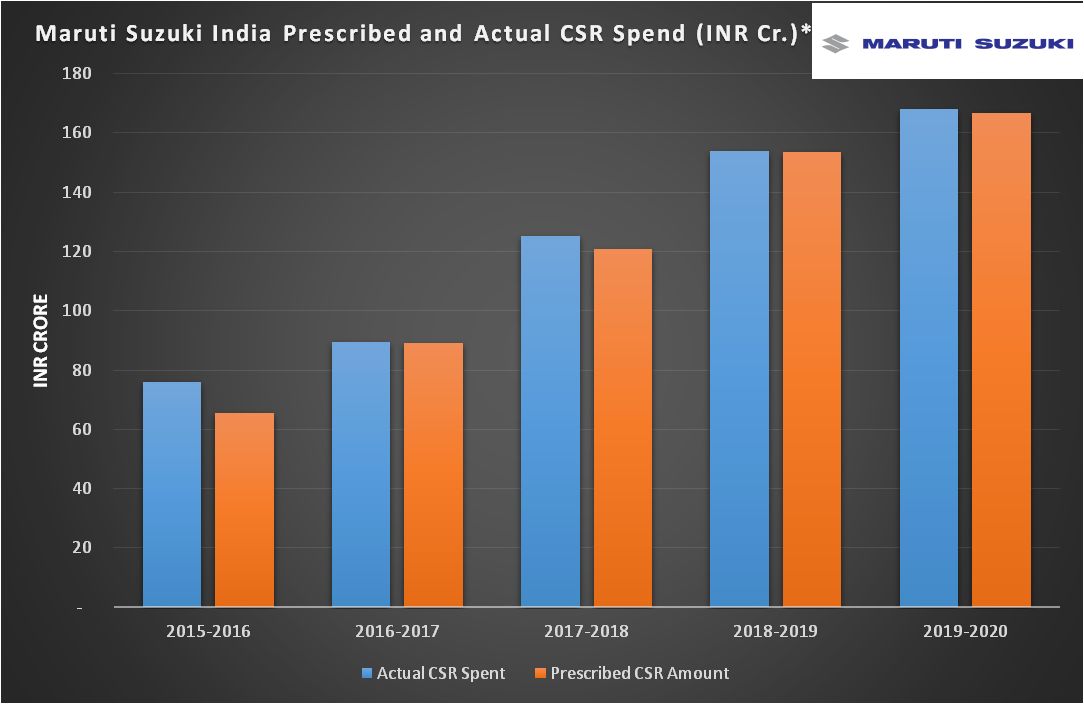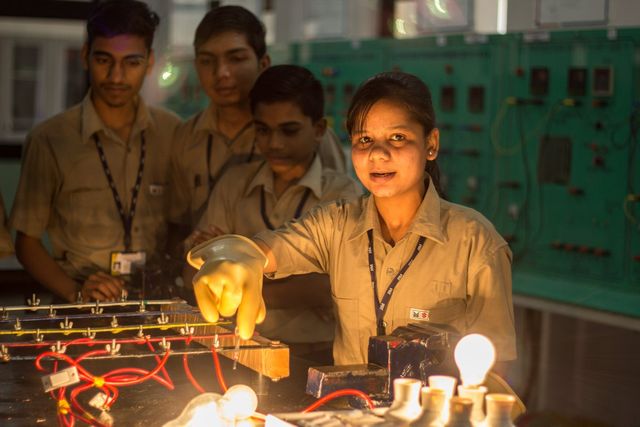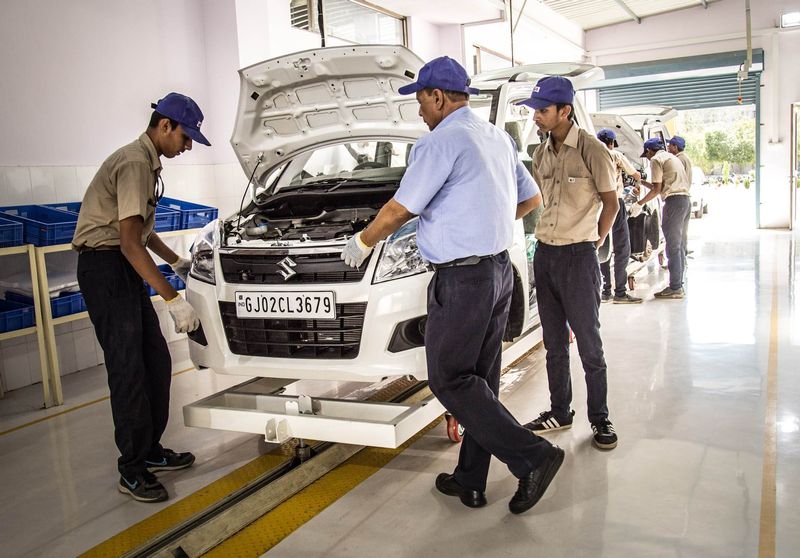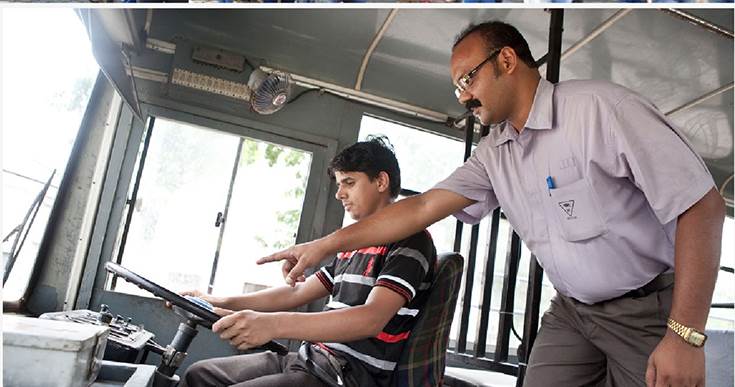Beyond healthcare and education, automobile companies tend to prioritise road safety and vocational skilling in their social welfare pool. CSR of Maruti Suzuki has contributed to the sustainable development of India in the same vein.
The organisation undertakes road safety consciousness and is working with State governments to make a bigger impact. Skill training is top priority, with a number of students coming out of the Maruti Suzuki CSR programmes job-ready and employable. CSR projects are undertaken through the Maruti Suzuki Foundation in close collaboration with various implementation agencies.
Not only has the CSR spend been increasing year-on-year, it is almost always higher than the amount prescribed. For example, in 2019-20, the company spent its full budget of Rs. 168.2 crores on social initiatives.
1. About Maruti Suzuki India
Maruti Suzuki India was formed in 1981 as the result of a joint venture between the Indian Government and Japanese firm Suzuki Motor Corporation (SMC). Today, it is the largest subsidiary of SMC in both volume and sales, making it a profitable joint venture to say the least. The public limited company has manufacturing units at Gurugram and Manesar (Haryana).
Another subsidiary of SMC that was birthed much later in 2017 is Suzuki Motor Gujarat Private Limited (SMG). Headquartered in Gujarat, it was the result of a growing demand for the brand’s affordable and efficient cars.
2. Values driving CSR of Maruti Suzuki
What makes this brand’s value system unique is the amalgamation of a Japanese approach and an Indian soul. Japanese culture is as ancient as it is high-tech. The people of Japan arguably have the best work ethic in the world; their social etiquette is carefully calibrated and their punctuality is legendary.
CSR of Maruti Suzuki is mapped out on the same value system that drives the company’s business operations. Fundamental to the way of being here is the principle of ‘optimum resource utilisation’. Not only does this enhance the efficiency of operations it also ties in with the corporate social responsibility of Maruti Suzuki. Optimum resource utilisation leads to more energy and resource conservation, thus fulfilling the manufacturer’s contribution to the circular economy.
Using sustainable products and raw materials means a lower carbon footprint. Less is more, and using less does more good in this regard. Sustainability is not always about adding elements and increasing complexity; more often than not, it’s about consuming less. Maruti Suzuki corporate social responsibility makes visual impact by making such timeless wisdom part of the way it approaches corporate citizenship.
3. Leaders Speak
3.1. Says Chairman R. C. Bhargava:
 “All the CSR programmes approved by the Board are being implemented effectively. The effort is to increase the cost effectiveness of our implementation and this is helped by an independent external evaluation. In addition, the company is building a 50-bed hospital in the Mehsana area of Gujarat, which lacks in medical facilities. This would be operational by April 2021. It can later be expanded to a 100-bed hospital if required. Our partner for operating the hospital is Zydus Cadilla. A school is also being built in the same area and would be progressively expanded to provide education up to class 12. Its start has had to be postponed to June 2021 because of the COVID-19 pandemic.”
“All the CSR programmes approved by the Board are being implemented effectively. The effort is to increase the cost effectiveness of our implementation and this is helped by an independent external evaluation. In addition, the company is building a 50-bed hospital in the Mehsana area of Gujarat, which lacks in medical facilities. This would be operational by April 2021. It can later be expanded to a 100-bed hospital if required. Our partner for operating the hospital is Zydus Cadilla. A school is also being built in the same area and would be progressively expanded to provide education up to class 12. Its start has had to be postponed to June 2021 because of the COVID-19 pandemic.”
3.2. Says MD and CEO Kenichi Ayukawa:
 “CSR of Maruti Suzuki India continued to implement village development programmes in the areas of health, education, water and sanitation and community infrastructure. Some key initiatives in these areas include building a 50-bed hospital in Sitapur, Gujarat, in partnership with Zydus Hospitals and setting up a school in Sitapur, Gujarat, in partnership with Podar Education Network. In 2020, a mechanised solid waste management facility was set up in Manesar for converting organic waste to compost, contributing to the ‘Swachh Bharat’ mission of the Government.”
“CSR of Maruti Suzuki India continued to implement village development programmes in the areas of health, education, water and sanitation and community infrastructure. Some key initiatives in these areas include building a 50-bed hospital in Sitapur, Gujarat, in partnership with Zydus Hospitals and setting up a school in Sitapur, Gujarat, in partnership with Podar Education Network. In 2020, a mechanised solid waste management facility was set up in Manesar for converting organic waste to compost, contributing to the ‘Swachh Bharat’ mission of the Government.”
“The company aligns with the Government of India’s flagship ‘Skill India’ mission to impart the relevant skills training to generate livelihood opportunities for people and to create a pool of skilled workforce for the success of the ‘Make In India’ initiative. In addition to supporting 127 Industrial Training Institutes across the country, the company has taken forward the CSR initiative of establishing the Japan-India Institute (JIM), by setting up the second JIM in Haryana in FY 2019-20, after the success of JIM, Mehsana, Gujarat. In the area of road safety, we are investing in technology for improving the driving habits of people through all stages – education, testing and enforcement. The company already has a massive training network for safe driving.”
4. CSR Spend

A graph of the CSR spend for the last 5 years shows that the budget has been increasing every financial year. With profits increasing, the amount allocated for corporate citizenship as per the norms stipulated in the Companies Act has also been going up.
Moreover, CSR of Maruti Suzuki is commendable for honouring its monetary commitment and utilising more than the prescribed sum every year. The Board has been strictly ensuring that the company spends at least 2% of the average net profit for the previous three years on corporate responsibility. Any surplus arising from the CSR projects is not considered part of business profits.
5. CSR Policy
The CSR policy aims to make lasting and meaningful impact in the nearby communities. Maruti Suzuki CSR projects are to be implemented with the famous Japanese precision for timeliness and a clear set of objectives and strategic plan. The cornerstones are stakeholder engagement and shared value creation.
Maruti Suzuki corporate social responsibility primarily focuses on village development, road safety and skill development. The targets are set in line with the national human development and UN Sustainable Development Goals (SDG).
Rather than spreading itself too thin, the company tries to make a visible impact and succeeds by taking on fewer programmes than other largescale multinational corporations that align with its core values. The CSR department and the implementing partners consequently get the time and resources to make lasting impact since they aren’t overwhelmed by too many initiatives in far-out locations.
5.1. Focus Areas
Although the company has set up several driving schools in partnership with dealers, Maruti Suzuki CSR puts road safety at the top of the list of activities since there isn’t much awareness about it in the consciousness of the average Indian. Pedestrians and drivers are known to flout traffic rules in every small town and large metro. Hence the concern with scaling up the tally of driving schools in India.
As a top brand in car manufacturing, it’s no surprise that quality driving training is another concern. Getting state governments and the local administration involved in road safety awareness, reducing the number of road accidents and law enforcement.
Refresher training for autorickshaw, truck and bus drivers aims to improve their knowledge of traffic regulation and ensure their own health and safety. Maruti Suzuki CSR projects include road safety awareness campaigns for school children, women and youngsters across various media and social modes.

Skilling is another big one in the CSR policy of Maruti Suzuki India, which is expanding the pool of a skilled workforce for the 4IR (Fourth Industrial Revolution). Various skill development projects make good use of Japanese manufacturing practices and international expertise in training for giving industry exposure to young people in India.
Courses at the Industrial Training Institutes (ITIs) make underprivileged youth employable and also impart soft skills such as Kaizen (the timeless Japanese philosophy of continuous improvement). Other skilling initiatives foster entrepreneurship so that impoverished young people can thrive and help others make a livelihood in the process. It’s a win-win model for welfare.
Water stewardship and sanitation programmes include safe drinking water provisions, solid and liquid waste management, minimising ODC (Open Defecation) by constructing toilets in people’s homes.
As an automobile manufacturer, Maruti Suzuki corporate social responsibility softens the blow for families affected by road accidents. Scholarships to support the education and training of children who have lost a parent in an accident-related death are part of the CSR policy.
Other education initiatives involve tie-ups with the Ministry of Education for infrastructural improvements in government schools, scholarships for deserving students for higher education and technical training.
5.2. Maruti Suzuki CSR Project Locations
While road safety initiatives span various States, community development by CSR of Maruti Suzuki is active in 26 villages around the plants in Haryana and Gujarat. Health care, education, rural infrastructure, access to water and sanitation are the chief segments of engagement.
5.3. Implementation of CSR Policy
Maruti Suzuki CSR projects are designed with the CSR Policy in mind which builds on best practices of successful and impactful programmes. For implementation of all these social initiatives, the company has dedicated teams that work closely with the Indian Government, communities in the vicinity and other agencies.
Maruti Suzuki Foundation implements the programmes either directly or through another trust or foundation and NGO partners, business partners or registered societies. An expert agency or consultancy firm does baseline surveys before the CSR of Maruti Suzuki takes on a project. A Need Assessment Survey is done to discern where exactly the community needs support. The results of these surveys form the basis of community development programmes.
6. CSR Committee
The CSR Committee at this firm comprises Chairman R. C. Bhargava, MD and CEO K. Ayukawa and independent director R. P. Singh. The CSR Committee is entrusted with formulating the CSR Policy and recommending it to the Board. It will monitor the policy at regular intervals and suggest any changes required in keeping with the times.
This team also decides on the projects that will eventually be taken up, as per Schedule VII of the Companies Act. It also decides on the amount to be spent on the various CSR projects.
6.1. CSR Coordinating Team
The CSR and Sustainability Department under Corporate Planning Division is essentially the CSR Coordinating Team at this organisation. This team does everything from coordinating with all the implementing departments concerned to reporting on the status of projects to the CSR committee. This team is in charge of documentation and reporting of all the Maruti Suzuki CSR activities in compliance with corporate law and the Companies Act.
7. Road Safety CSR of Maruti Suzuki
Road accidents have taken many a life, most often because of the mistakes of the driver of the two or four wheeler involved. Maruti Suzuki corporate social responsibility strives to make roads safer by bettering people’s driving skills and spreading awareness.
7.1. Institutes of Driving Training and Research
There are five states where the company has established a total of 7 Institutes of Driving Training and Research (IDTR) and 19 Road Safety Knowledge Centres (RSKC). Equipped with test tracks and driving simulators and various courses for drivers of all manner of vehicles, including three-wheelers and forklifts, IDTRs set up by CSR at Maruti Suzuki are cutting edge. Collectively, these centres and institutes have trained 3.4 million drivers in the last two decades.
7.2. Automated Driving Test Centres
CSR at Maruti Suzuki runs 12 Automated Driving Test Centres (ADTC) in Delhi and one in Dehradun in association with the state transport departments. ADTCs have tracks designed for driving tests, and cutting edge technology like high res cameras for recording the tests, biometrics and analytics tools. These centres have tested 1 lakh candidates till date.
7.3. Traffic Safety Management System
The Traffic Safety Management System (TSMS) was set up in 13 high traffic locations in association with the Delhi police. TSMS uses 3D radars and high-res cameras to catch drivers flouting traffic rules. They capture speeding, red-light violation and even those driving on the wrong side of the road, something seen regularly on Indian streets.
The digital system has made the work of the Delhi police more convenient since the control room gets the information on violations immediately and can SMS an electronic penalty slip without having to chase the violator down. Thanks to TSMS, Delhi police issued 2.4 million e-penalty slips in FY 2019-20.
7.4 Road Safety Education
‘Catch Them Young’ is a CSR project for school children started in December 2019. The Maruti Suzuki corporate social responsibility programme forms Road Safety Clubs that includes teachers and students. They engage in mock road scene investigations and competitions.
7.5. #PehniKya
Did you know that wearing a seat belt that decrease the risk of accident-related death by 45-60% according to the World Health Organisation. When a habit so simple can save your life in an emergency, buckling up becomes a relevant topic to tell passengers and drivers about.
With airbags becoming more common, the importance of seat belts cannot be driven home enough. If you aren’t wearing a seat belt in a car crash, the airbag could cause more damage. Despite the importance of buckling up, a pan India survey of cities by MSIL found that only a quarter of car users remember to wear their seat belt.
Pehni Kya is a 360-degree Maruti Suzuki CSR campaign that is persuading families to buckle up at all times. It spans various media including radio, television and print, and of course, social media.
8. Skill Development
Half of India’s huge 1.38 billion population comprises young people under 25. This is Generation Z, which will comprise the workforce of the immediate future. Maruti Suzuki corporate social responsibility is harnessing this huge demographic through its expertly designed skill development programmes.
The skilling initiatives are creating a pool of job-ready youngsters for the automobile and industrial sectors. The focus is on providing free training and industry exposure to underprivileged youth so that they can have a dignified livelihood.
8.1 Japan-India Institute for Manufacturing (JIM)


